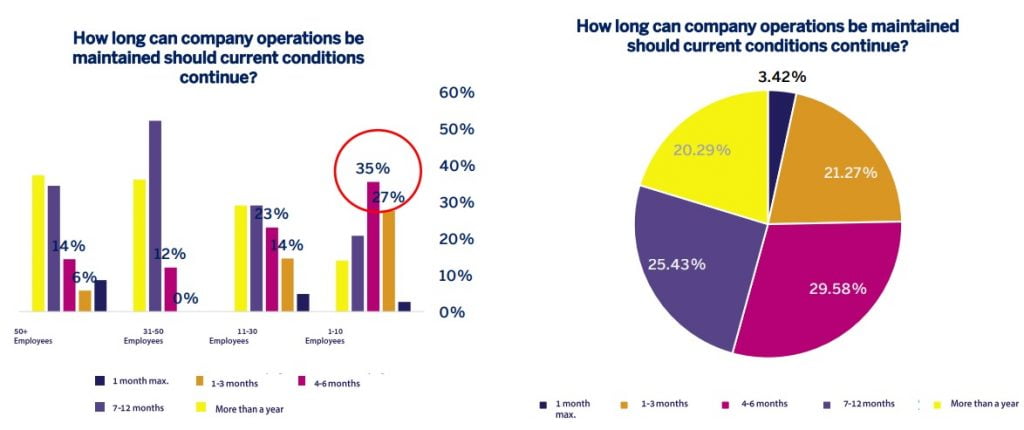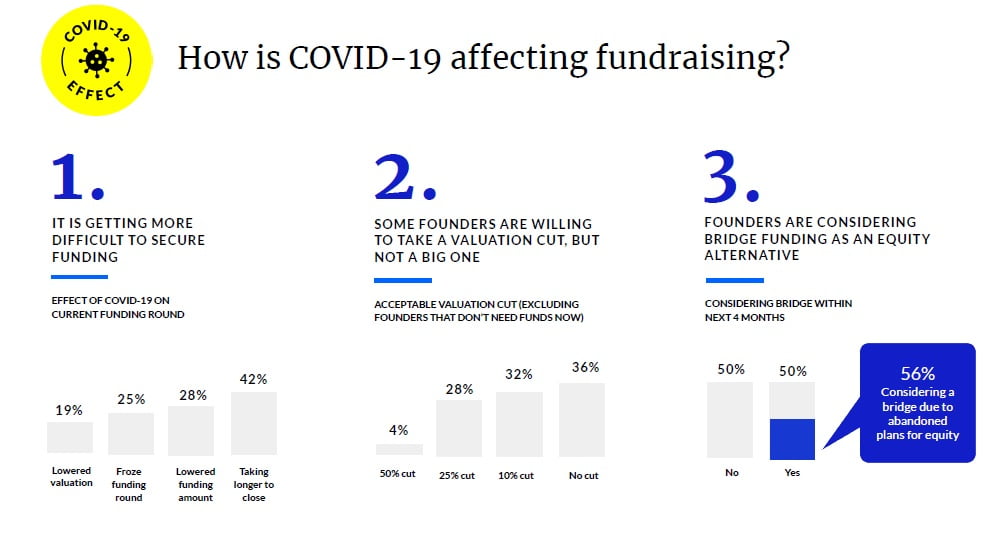The COVID-19 pandemic has had a dire effect on the future viability of small, early-stage startups in the Israeli ecosystem, according to two separate, recently released reports.
A majority of companies (65 percent) with up to 10 employees responding to a survey conducted in mid-May by the Israel Innovation Authority and the Israel Advanced Technologies Industries (IATI) said that they may have to close within six months without further funding should the current market conditions continue. Companies with up to 30 employees gave themselves between seven months and more than a year, according to the survey which polled over 400 tech startups and companies, half of them in pre-seed or seed stages.
Of the 414 firms surveyed, 41 percent are in the software sector, 41 percent are in healthcare, and 18 percent are hardware and communications companies.
Over a third of the companies put some employees on unpaid leave during the lockdown in Israel which began in mid-March. This was more prevalent in smaller companies with up to 10 employees. And about a quarter laid off workers, including 14 percent with wide-scale layoffs of at least 15 percent of the workforce.
In addition, 57 percent of the respondents said there are extensive layoffs plans in the next six months or so. The sectors most affected by layoffs were software and hardware and communications, according to the report.
Overall, 71 percent of the companies surveyed reported that they have frozen hiring processes due to the crisis and a quarter have reported significant wage cuts.

A majority of companies have also reported a slowdown in funding, with over half reporting that the process is progressing more slowly than before, and 40 percent reporting that they have been notified by investors that they are halting the funding process.
Furthermore, half of the companies polled said they submitted requests for loans from a financial entity or a bank that have been denied. According to the survey, most companies said they are considering applying for grants offered by the Innovation Authority.

“The picture painted by this comprehensive survey shows that high-tech companies, with an emphasis on smaller startups, are facing significant challenges,” said Israel Innovation Authority CEO Aharon Aharon. “The fact that 65 percent of startup companies with between 1-10 employees have reported that they would be unable to continue beyond six months highlights the importance of government support. The Innovation Authority continues to monitor conditions in the high-tech industry, and is committed to providing tools to assist its recovery and the growth of the entire Israeli economy.”
“The innovation industry is the main growth engine of the economy, and has been carrying the Israeli economy on its back towards unprecedented growth and prosperity, almost without any government support. No doubt government must provide a comprehensive and immediate response to the problems already afflicting the industry due to the crisis, as well as the problems expected in its aftermath, in order to allow the industry to stabilize itself in the face of the expected recession,” said Karin Meir Rubenstein, CEO and president of IATI.
A separate report released earlier in May had similar findings and additional insights. That survey, part of an initiative called Startup Snapshot was created by Y.Benjamin Strategic Marketing in partnership with Leumitech, Samsung Next, and HFN Law.
Sign up for our free weekly newsletter
SubscribeIt was based on data from over 400 startups collected before and during the outbreak of COVID-19 in Israel, a majority with fewer than 20 employees. Close to half reported an immediate halt to hiring new employees.
Due to the hiring freeze and the layoffs in the wake of the outbreak, 86 percent of startup founders agreed that more qualified applicants were available today compared to pre-COVID-19. As a result, 57 percent of startups view the situation as an opportunity to restructure their teams and tap into the pool of top talent suddenly available in the market
In addition, 61 percent of respondents said they have lowered salaries in exchange for increased options once the pandemic hit Israel.
“Companies are adjusting to the ‘new normal” and trying to understand the effects of the current crisis. One of their first moves was a hiring freeze. We expect hiring to restart once companies adjust and better understand their new hiring needs and available opportunities,” said Hanan Haviv, Head of High-Tech at HFN Law.
On the fundraising side, 42 percent of polled companies reported that it is taking them longer than expected to raise funds, and 25 percent said they were freezing the fundraising process. Over 60 percent of startup founders reported that they are willing to take a valuation cut to secure funding now.

Startup Snapshot plans to release a number of reports on the Israel tech ecosystem throughout the year. The team says the goal is to create the first data-sharing platform for Israel, working to increase transparency in the ecosystem.
“As an investment banker, I saw the wealth of information that was available with public companies. The startup world is missing that kind of material today. With Startup Snapshot, my goal is to create a new standard of data-sharing for our ecosystem, providing a comprehensive picture that Israeli entrepreneurs could consult for guidance,” noted Yael Benjamin, founder of Y. Benjamin Strategic Marketing.
Global trends of the COVID-19 effect on startups
The findings of the two surveys appear to be in line with global trends. According to a report titled “The Impact of COVID-19 on Global Startup Ecosystems” released this month by Startup Genome, 4 out of every 10 global startups have three months or fewer of cash runway, and should the funding situation remain the same, they may not survive. In addition, over 30 percent of global startups have less than six months worth of cash.
According to the report, over 74 percent of startups have had to terminate full-time employees since the crisis began with 39 percent of all startups having to lay off 20 percent or more of their staff, and 26 percent having to let go of 60 percent of employees or more. North America had the biggest share of companies reducing headcount (84 percent), followed by Europe (67 percent) and Asia (59 percent).
Overall, global venture capital funding has dropped by about 20 percent since the onset of the coronavirus crisis in December 2019, according to the survey.
Related posts

Editors’ & Readers’ Choice: 10 Favorite NoCamels Articles

Forward Facing: What Does The Future Hold For Israeli High-Tech?

Impact Innovation: Israeli Startups That Could Shape Our Future





Facebook comments